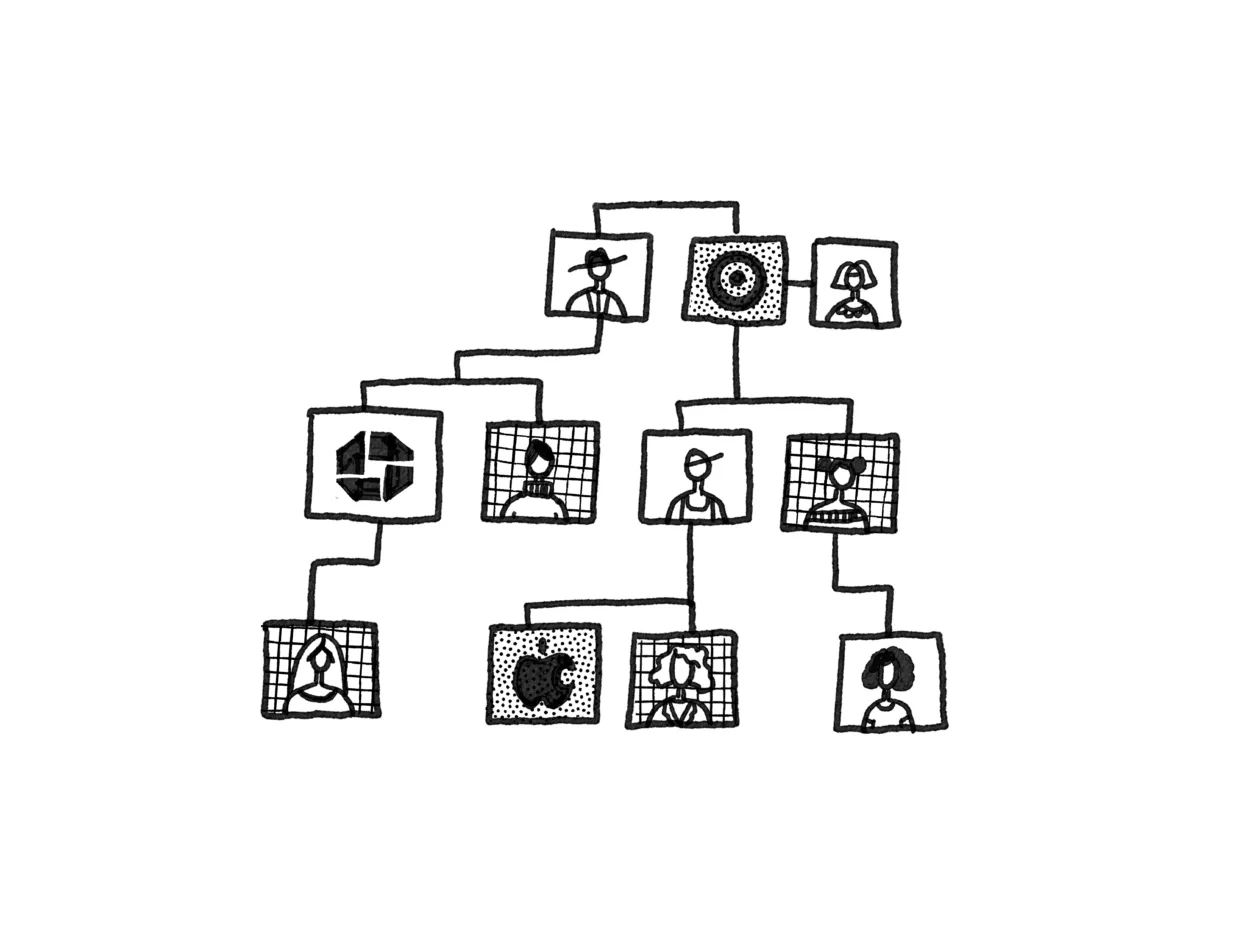
Image by Ivy Sanders Schneider

Image by Ivy Sanders Schneider
As a proud member of the Chase Sapphire Preferred family, I receive, in addition to statements detailing my credit card debt, emails imploring me to “Earn cash back from doing what you love,” e.g., subscribing to Fubo or purchasing wine from the Wall Street Journal. These companies and I form an affinity network based on generous interest rates; we strengthen our bonds through 1.5-percent-back deals. You might call us “chosen family,” because I can sooner imagine my bank deploying the term sincerely than I can any of my gays.
In the 1980s, the anthropologist Kath Weston began conducting field research among San Francisco’s homosexual population for what would become Families We Choose: Lesbians, Gays, Kinship (1991). The phrase “chosen family” had appeared in earlier texts, like Karen Lindsey’s Friends as Family (1981), but Weston used it to understand and legitimate “gay kinship ideologies,” which, she wrote, dispute “the belief that procreation alone constitutes kinship, and that ‘nonbiological’ ties must be patterned after a biological model (like adoption) or forfeit any claim to kinship status.”
The logic underlying Weston’s formulation is hardly obsolete. If the heteropatriarchal family unit accepts more of its queer children now, and forces fewer to seek alternative arrangements for mere survival, it remains a tyrannical and mutilating force for many, whatever their sexuality or gender. In 2021 alone, more than 500,000 children in the United States were abused and neglected by their parents, according to the Department of Health and Human Services’s most recent “Child Maltreatment” report — and those are only the incidents that were reported and investigated. Psychoanalysts and family abolitionists point to the family as necessarily figuring and thus disfiguring the subject. Countless novels and memoirs animate this insight. (Kathleen Alcott, writing about her father in Harper’s last year: “He had made me feel soiled for eternity, separate from other people.”) The right to choose supplemental or replacement kin, always constrained by circumstance, ought to belong to everyone. All this to say: I do not begrudge Julia Fox her chosen family.
But between Weston’s coinage and RuPaul’s teary-eyed Drag Race declaration that “as gay people, we get to choose our family,” some familiar forces — corporate positivity, the progressive transfiguration of all relations into relations of exchange, the tendency of academic terminology to shed the specificity of its original meaning and become debased with the passage of time and the uptake by wider publics — complicated the situation. Words expressing the possibility of solidarity and mutual aid have also come to express the reality of alienation and atomization. “Chosen family” now sounds flimsy, convenient, like a set erected for the duration of a television shoot and then ripped down.
In his Poetics, Aristotle uses the term “anagnorisis” to name the “change from ignorance to knowledge” that a character in a work may undergo, as when a tragic hero discerns the true identity of another character and, simultaneously, his own nature. Most of us will not discover ourselves to have birthed “a husband from a husband, children from a child,” as Oedipus’s mother-wife, Jocasta, does; I have it on good authority that my boyfriend is not my son. But those who pursue chosen family will still suffer revelations. A friend may turn out to be a brother, who may turn out to be an asshole. To be family is to be capable of committing the most outrageous sins against each other, to mangle and abuse and violate, without the risk that these depredations will negate the original fact: you’re related. A relation remains, even if broken, estranged, disowned, or ex’d. As much as love, material and emotional support, or solidarity, the capacity to deform characterizes family.
That family can be ultimately supportive and caring — a shelter warmed by the good intentions of people who “always have your back” — is an infantile if alluring fantasy, one regularly exploited by politicians and corporations whose operations entrench the primacy of the family unit while inhibiting its members’ capacity to flourish. To believe that one’s chosen family could offer unconditional care or resources would be to indulge a similarly absurd fantasy. But for the concept to mean something more than “friends” or “gay people I see at parties,” its practitioners must obligate themselves to one another to such a degree that they risk mutual disfigurement.
As things stand, chosen family can scan less as an emblem of queer perseverance and fellowship than as yet another means of self-branding, self-curation, exclusion — a cynical shorthand for establishing worth through association, without the baggage or responsibilities associated with “real” family. The phrase evokes, for me, the dream of an unconstrained movement of goods, a customer who is always right, whose choice is the right to choose again, without delay or remorse, whatever he likes, whenever he likes, in pursuit of what he takes to be self-interest.
“Chosen family” could instead imply the considered foreclosure of the possibility of deselection: no returns. In Love’s Work, the philosopher Gillian Rose writes that “it is love to laugh bitterly, purgatively, purgatorially, and then to be quiet.” To sit with one’s choices, perhaps, as I sit with my credit card statements: reverently, solemnly, resigned to service my debts, hopeful that they’ll be balanced by joy or comfort. Chased and chastened.
Paul McAdory is a writer from Mississippi. He lives in Brooklyn.